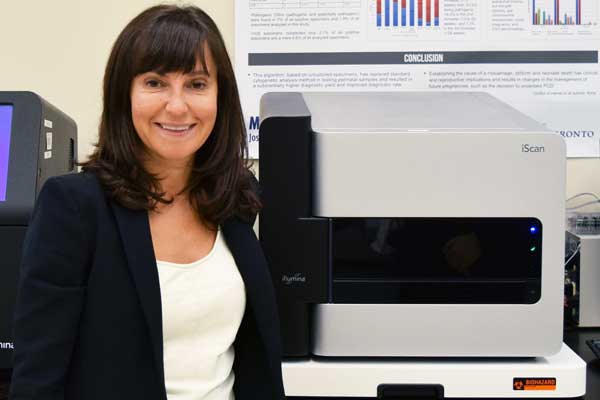
New test to detect common cause of male infertility will help men avoid testicular biopsies
Published: November 4, 2015
A University of Toronto scientist has developed a targeted test for the most common cause of male infertility that will help men avoid unnecessary, sometimes painful procedures and plan for the future.
“We’ve created a test that detects irregularities in men’s DNA that frequently lead to male infertility,” said Elena Kolomietz, an associate professor in the Faculty of Medicine’s department of laboratory medicine and pathobiology. “Our technology is unique to the world, and our goal is to diagnose men earlier and more accurately.”
The key to this type of infertility lies in the male Y chromosome. The Y chromosome contains genetic information that allows sperm to develop. When a sperm cell is created, the chromosomes duplicate, rearrange and sometimes misalign, leading to missing genes called microdeletions. Men with these microdeletions may produce less sperm or none at all.
Infertility is a major issue and affects 15 per cent of couples who are trying to conceive. Male infertility accounts for half of these cases, with Y chromosome microdeletions as the most common cause.
 Previous technology could only analyze 15 different DNA regions at a time, while the microarray can analyze 15,000.
Previous technology could only analyze 15 different DNA regions at a time, while the microarray can analyze 15,000.
Using her targeted technology, Kolomietz diagnoses three types of chromosomal abnormalities. The first two, called azoospermia factor a and b, mean that a man cannot produce any sperm.
“If a man is diagnosed with these abnormalities, he can avoid further unnecessary and painful testing, including a testicular biopsy,” said Kolomietz, also co-head of the division of diagnostic medical genetics at Mount Sinai Hospital.
50 per cent of men with another microdeletion, called azoospermia factor c, will have some sperm. In these cases, it’s important for men to be diagnosed early because the quality of their sperm declines as they age.
“We want to raise awareness about this condition,” said Kolomietz. “While assisted reproductive technology is an option for men with this microdeletion, all of their sons will inherit the same abnormality and will most likely have infertility issues.”
Kolomietz developed her test with the help of Professor Stephen Scherer, the director of The Hospital for Sick Children’s Centre of Applied Genomics. It uses microarray technology, which combines robotics, chemistry, computer science, and biology to study many points within a chromosome at one time. As a result, the test visualizes the entire Y chromosome and detects all microdeletions.
In addition, this technology can reveal new irregularities that could explain as yet unidentified causes of male infertility. Older technology only studied limited parts of the chromosome, missing many abnormalities.
While the benefits of the test are clear, it’s not included in routine infertility testing in Canada.
“I strongly believe that Y chromosome microdeletion has to become part of the routine male infertility workup,“ Kolomietz said. “The cost is comparable to similar tests, and we have to educate patients about their options.”
Next, Kolomietz plans to move her test to next generation sequencing, which is even more accurate and more affordable than the microarray. She’s currently working with a company to custom design a test panel for many types of male infertility and hopes to launch it within the next two years.
“Dealing with infertility is never easy, but this test will help people plan for the future. I’m looking forward to moving this technology to next generation sequencing and making it even more accessible to patients.”



